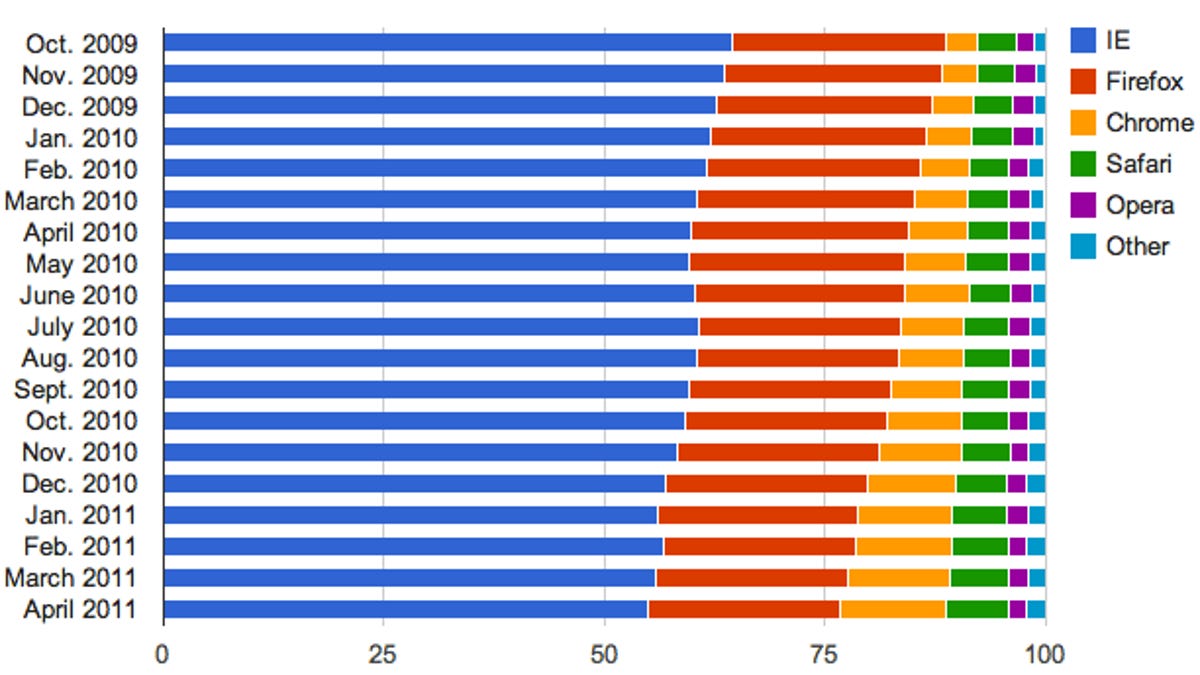IE9 passes Opera in browser usage
Microsoft's latest version of its browser is catching on, though not fast enough to reverse IE's overall slide. Also: Apple's iOS now accounts for 2.2 percent of OSes used to surf the Web.

Microsoft's browser continues to lose share of worldwide usage, but its new IE9 version managed to gain enough usage that new statistics show it surpassing one smaller rival, Opera.
Internet Explorer 9 accounted for 2.41 percent of browser usage in April, its first full month on the market, according to Net Applications. Opera accounted for 2.14 percent. And IE overall dropped from 55.9 percent in March to 55.1 percent in April.
Two browsers, Google's Chrome and Apple's Safari, outpaced the overall growth in Web usage. Chrome rose from 11.6 percent to 11.9 percent, while Safari grew from 6.6 percent to 7.2 percent. Mozilla's Firefox dipped from 21.8 percent to 21.6 percent.
Mozilla has its bright spot, too: Firefox 4 accounted for 5.4 percent of usage overall, though it arrived later than IE9. It runs not just on older versions of Windows, notably Windows XP, but also on Mac OS X and Linux.
The move to modern browsers enables a new generation of more interactive Web sites and applications. Changes in IE usage are particularly important in that move because the decade-old IE6 remains the bane of Web developers. Its usage continues to gradually slip, though, and Windows 7's rise is helping to usher IE6 out.
In part because of its iOS mobile operating system, Apple had a strong showing in Web activity--though not all of that was with Safari. Apple operating systems accounted for 7.6 percent of browser usage in April. Of that 5.4 percent were browsers on Mac OS X, 1.2 percent on iPhones, 0.8 percent on iPads, and 0.2 percent on iPod Touches.
In other words, 2.2 percent of browser usage took place on Apple's mobile operating system. That may sound like a small fraction, but it's a large number of people in absolute terms.
Windows, of course, is the dominant operating system used to browse the Web. In April, Windows XP--which can't run IE9--remained the most popular, with 53.2 percent of usage. Windows 7, in second place, surpassed 1 in 4 Windows users to reach 25.1 percent.
On Windows 7, IE9 accounted for 7.5 percent of browser usage, NetApplications said.
Microsoft is "excited" about the IE9 results, Ryan Gavin, senior director of IE business and marketing, said in a blog post. He noted that by the end of the month, IE9 usage on Windows 7 had increased to nearly 10 percent.
IE9 serves as a vehicle for Microsoft to promote Windows 7 and to improve it for customers.
"For Windows 7 customers, the best browser for experiencing the web is IE9," he said in an assertion his rivals likely disagree with. "We built IE9 to help developers unleash faster and richer web experiences that can take full advantage of the capabilities of Windows 7 and modern PC hardware. So for us, success means that we have real sites and developers taking advantage of those unique capabilities to deliver that better Web experience."

